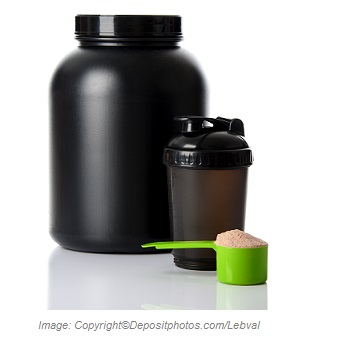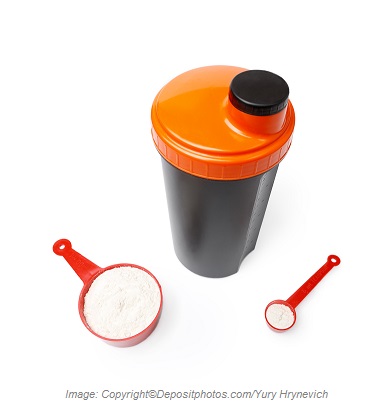 supplement among vegetarians. Soy protein is a complete protein that comes from soybean. Soybean is considered a legume.
supplement among vegetarians. Soy protein is a complete protein that comes from soybean. Soybean is considered a legume.Digestibility and Absorption:
Soy protein has the biologic value (BV) of 74, which is lower than those of whey (with BV over 100) and casein (with BV of 77). Though soy is a compete protein and has all the essential amino acids, it is considered a low quality protein. However, soy protein has some health advantages compared to whey and casein proteins.
Soy protein is digested by the same enzymes that break down whey and casein. The digestibility of soy protein is about 95%, while it is 65% for soybeans. The absorption of soy protein is faster than that of casein protein and slower than that of whey protein.
Compositions of Soy:
Amino acid compositions of soy are different than those of whey, casein, and egg proteins (see “Whey Protein”). Compared to whey, soy is higher in glutamine.
A unique compound in soy protein is phytoestrogens. They are phytonutrients with many health benefits. The estrogenic effects of soy are more prominent in female athletes than male athletes. For more information about phytoestrogens, see “Phytoestrogens” under the section of “Phytonutrients”.
The main phytoestrogens in soy protein are isoflavones, of which genistein and daidzein are the major ones. Isoflavones are important in bone health. For the amounts of isoflavones in different soy products, see the table below.
Isoflavones in Soy Products: | |
Soy products | Isoflavones (mg per one gram of the product) |
Soy flour | 2.6 |
Fermented soybean | 1.3 |
Fried soybean curd | 0.7 |
Cooked soybean | 0.6 |
Soy protein powder | 0.5 |
Soybean curd | 0.5 |
Soy milk | 0.4 |
Soybean paste | 0.4 |
Soy sauce | 0.015 |
Another distinctive ingredient of soy protein is “lunasin”. It is a soy dipeptide that can be found in rye, barley, and wheat as well. It is claimed that lunasin has anti – inflammatory and anti – cancer activities, particularly against leukemia.
Indications of Using Soy Protein:
Soy protein has many health benefits especially in women, as it contains phytoestrogens.
Athletic Indications of Soy Protein:
Female athletes may benefit from soy protein more than male athletes. Soy protein could be beneficial in the following conditions:
- Female Athlete Triad Syndrome (FATS). See “Female Athlete Triad Syndrome” under the section of “Athletic Disorders”.
- Vegetarian and vegan athletes.

- Female athletes with any estrogen – sensitive cancers.
- Elderly female gym – goers with Osteoporosis.
Non – Athletic Indications of Soy Protein:
Soy protein may be useful in the following conditions:
- High levels of LDL cholesterol and triglyceride.
- Menopause.
- Osteoporosis.
- Estrogen – sensitive cancers.
- Diabetes.
- Vegetarians and vegans.
- Infants with lactase deficiency (as soy – based formulas).
- Infants with galactosemia (as soy – based formulas).
How to Take Soy Protein:
Soy protein is available in different formulations in the market, providing 20 – 25 grams of soy protein per serving. The ideal daily intake of soy protein has not been established yet, and it depends on the total daily requirement of protein and health status. You may use the following guidelines:
– Athletes: 30 – 50 grams a day upon wake up or after exercise.
– Athletes with Female Athlete Triad Syndrome: 50 – 70 grams a day upon wake up or after exercise.
– Osteoporosis: 40 grams a day of soy protein with 2 mg of isoflavones per one gram of powder.
– Menopause: 30 – 60 grams a day of soy protein with 40 – 60 mg of isoflavones.
– Vegetarians and vegans: 30 – 60 grams a day.
– High LDL cholesterol: 30 – 60 grams a day.
– Diabetes: 30 grams a day.
Interactions and Cautions:
Soy protein and fermented soy products have interactions with the following medications:
- MAOIs (monoamine oxidase inhibitors). These medications are used to treat depression and anxiety disorders. Fermented soy products contain tyramine. It is an amino acid that involves in regulating blood pressure and is needed to be metabolized by monoamine oxidase. MAOIs inhibit the breakdown of tyramine, leading to sudden increase in blood pressure. These medications include:Antibiotics: they decrease the effectiveness of soy protein.
- Isocarboxazid (Marplan).
- Phenelzine (Nardi).

- Selegiline (Emsam).
- Tranylcypromine (Parnate).
- Antibiotics: they decrease the effectiveness of soy protein.
- Probiotics: they increase the effectiveness of soy.
- Warfarin: soy may decrease the effectiveness of this medication.
- Birth control pills: soy may decrease the effectiveness of these pills.
- Tamoxifen: soy may decrease the effectiveness of this medication.
- Thyroid medications: soy may interfere with the absorption of these medications.
Soy protein should be used with extreme caution in the following medical conditions:
- Liver diseases.
- Kidney diseases.
- Chronic pancreatitis.
- Hartnup syndrome.
- Cystinuria.
Soy protein should be avoided in the following medical conditions:
- Acute renal failure.
- Hepatic encephalopathy.
- Diabetic nephropathy.
- Rhabdomyolysis (post – trauma/exercise myoglobinuria). See “Post – Exercise Rhabdomyolysis” under the section of “Athletic Disorders”.
- Low function thyroid. Some studies indicate that isoflavones in soy may inhibit TPO (thyroid peroxidase) and interfere with normal function of the thyroid (see “Hypothyroidism” under the section of “Medicinal Nutrition”). The amount of soy isoflavones that could affect the function of thyroid gland is about 30 mg per day.
- Children with congenital hypothyroidism. They should not be feed by soy – based formulas.
- Goiter.
Side Effects:
Allergic reactions to soy protein are less common than to whey and casein proteins. Some other reported side effects of soy protein are nausea, constipation, sleepiness, and fatigue.

